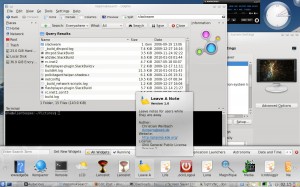![]() I am starting a new cycle of KDE packaging. The KDE community announced the general availability of KDE SC 4.13.0!
I am starting a new cycle of KDE packaging. The KDE community announced the general availability of KDE SC 4.13.0!
After creating three new “dependency” packages (xapian-core, qt-gstreamer and eigen3), I built my new KDE packages on Slackware-current. I have not tested them on Slackware 14.1 and will not guarantee that they are even useable on Slackware 14.1. If you want a taste of KDE 4.13 then please upgrade to slackware-current.
What’s new in KDE 4.13?
In KDE 4.13, major improvements are made to KDE’s Semantic Search technology, benefiting many applications. To be specific: Nepomuk has been replaced by Baloo, which performs better and avoids the data duplication currently seen in KDE (copies of the same data, think of emails, get replicated between nepomuk, akonadi and virtuoso leading to large homedirectory storage needs). A nepomuk-to-baloo migration should happen automatically when upgrading to the new KDE (according to the build log, that feature has been enabled), but I have not checked yet if that worked. Note that nepomuk is still part of the software compilation, to facilitate the migration and to allow non-KDE applications additional grace time to port their semantic search support from Nepomuk to Baloo.
KDE 4.13 can be seen as another transitional release: with Plasma Workspaces and the KDE Development Platform frozen and receiving only long term support, those teams are focusing on the transition to Frameworks 5. Still, there are interface and feature improvements to be found in several of the major applications, such as Okular (the document viewer) and Kate (the document editor) among which support for Baloo. And there is another new package: the foreign speech trainer Artikulate.
How to upgrade to KDE 4.13 ?
You will find all the installation/upgrade instructions that you need in the accompanying README file. That README also contains basic information for KDE recompilation using the provided SlackBuild script.
You are strongly advised to read and follow these installation/upgrade instructions!
Where to find packages for KDE 4.13 ?
Download locations are listed below (you will find the sources in ./source/4.13.0/ and packages in /current/4.13.0/ subdirectories). Using a mirror is preferred because you get more bandwidth from a mirror and it’s friendlier to the owners of the master server!
- http://alien.slackbook.org/ktown/ (the master repository), rsync URI: rsync://alien.slackbook.org/alien/ktown/
- http://taper.alienbase.nl/mirrors/alien-kde/ (my fast US mirror), rsync URI: rsync://taper.alienbase.nl/mirrors/alien-kde/
- http://repo.ukdw.ac.id/alien-kde/ (willysr’s Indonesian mirror), rsync URI: rsync://repo.ukdw.ac.id/alien-kde/
- http://slackware.org.uk/people/alien-kde/ (fast UK based mirror, run by Darren Austin), rsync URI: rsync://slackware.org.uk/people/alien-kde/
Postscript:
In two weeks, there will be another KDE 4.12 release; the final 4.12.5. Just like the previous 4.12 iterations, I will be compiling this on Slackware 14.1 and this final time, I will also publish them in the Slackware 14.1 directory of the ‘ktown’ repository, so that people running Slackware 14.1 and using slackpkg+ will automatically pick it up and get a nice upgrade to the latest super-stable KDE platform.
Have fun! Eric


Recent comments